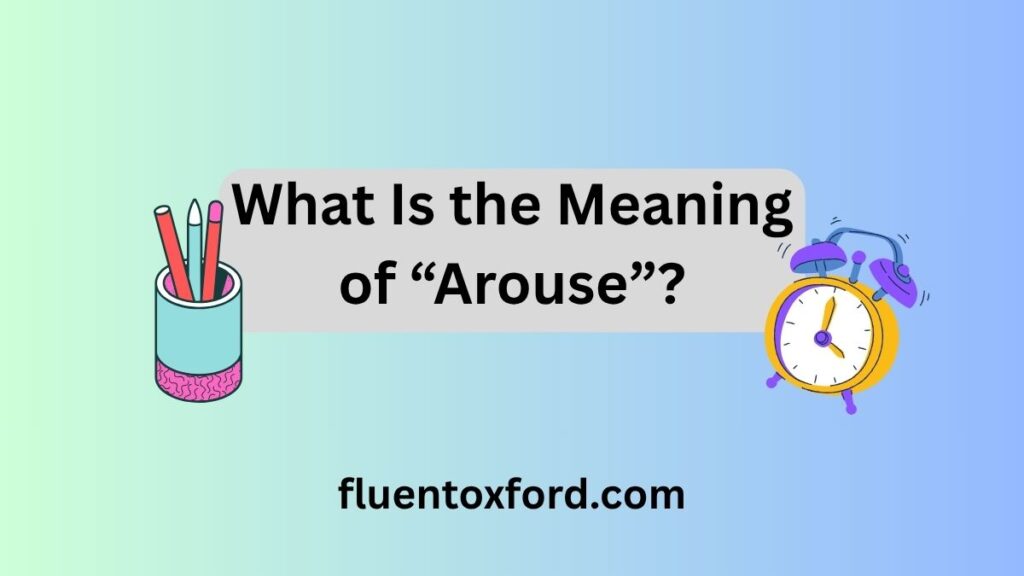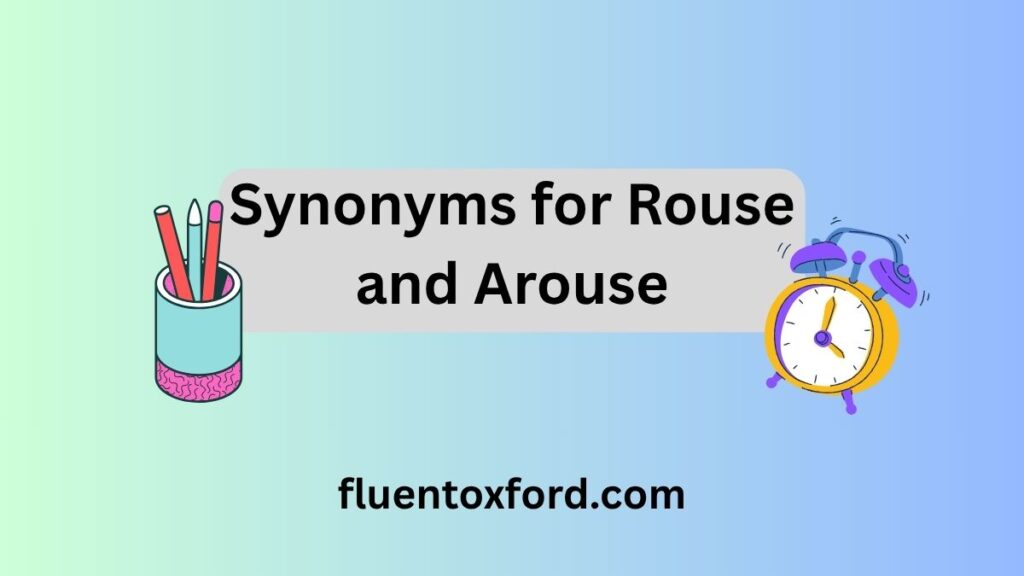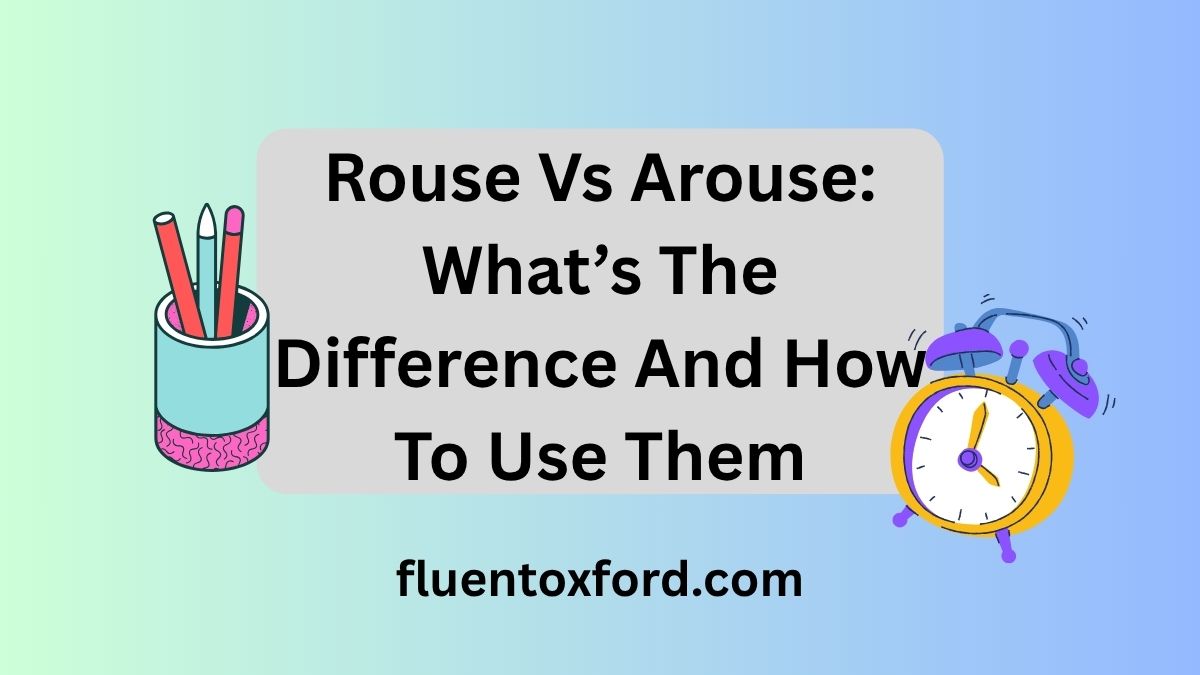Rouse vs Arouse Difference and usage refers to understanding the distinct meanings, contexts, and proper applications of two closely related verbs in English. While both imply the act of awakening or stimulating something, “rouse” typically involves physical activity or external action—like waking someone up—whereas “arouse” deals with internal or emotional responses, such as evoking curiosity, anger, or interest. Although they sound similar and share historical roots, they are not interchangeable in speech or writing.
Every writer or speaker has faced the subtle confusion these two words present. That moment of hesitation—should you say “rouse the audience” or “arouse the audience”? This topic doesn’t just clarify a common language trap—it empowers you to express yourself with greater accuracy, confidence, and impact. Knowing the correct usage not only sharpens your grammar but also enhances your style and tone.
Whether you’re a student, a writer, or a language enthusiast, Rouse vs. Arouse: Difference and usage offers practical insights that improve both written and spoken communication. By exploring clear definitions, real-life examples, and contextual comparisons, this guide breaks down Rouse vs. Arouse: Difference and usage in a way that’s simple, memorable, and immediately applicable. If precision in language matters to you, understanding Rouse vs. Arouse: Difference and usage is essential.
Why Rouse vs Arouse Causes Confusion
At first glance, rouse and arouse appear almost identical. Both are verbs. Both suggest triggering some kind of action or response. And both are tied to concepts like waking, stirring, or provoking.
But there’s the catch: their meanings, tone, and context can differ in very important ways.
Many English learners—and even native speakers—struggle with:
- Misusing arouse in place of rouse when talking about physical actions
- Overusing arouse and creating unintended suggestive meaning
- Misunderstanding the formal vs. conversational tone of each word
This article clears all of that up with solid examples, clear definitions, and side-by-side comparisons.
What Is the Meaning of “Rouse”?
Rouse is a verb with roots in action and awakening. It’s most commonly used when referring to physical awakening or stirring someone to act.
Rouse Meaning (Definition)
To wake someone from sleep, or to stir someone into physical or mental activity.
It can also imply:
- Inciting emotion (like anger or excitement)
- Rallying people into movement
- Interrupting calm or passivity
Common Usages of “Rouse”
- Wake from sleep: “She was roused by the alarm.”
- Stimulate to action: “The speaker roused the crowd with a passionate speech.”
- Provoke a reaction: “The injustice roused public outrage.”
Rouse in a Sentence
“He tried to rouse the team after a sluggish start to the game.”
Rouse has no noun form, and it’s primarily used in casual, everyday language. It’s straightforward, practical, and vivid.
What Is the Meaning of “Arouse”?

Arouse, on the other hand, leans toward the emotional, psychological, and sometimes sensual. It’s not usually used when talking about sleep or physical inactivity.
Arouse Meaning (Definition)
To stimulate an emotion, thought, desire, or reaction in someone.
It deals more with internal responses than physical action.
Common Usages of “Arouse”
- Emotional stimulation: “The story aroused sympathy.”
- Creating interest or curiosity: “The documentary aroused public curiosity.”
- Sexual context: “The scene was meant to arouse desire.”
Arouse in a Sentence
“The detective’s strange behavior aroused suspicion.”
It’s more formal than “rouse,” and often shows up in writing that deals with psychological response, literary tone, or even sensuality.
Rouse vs Arouse: Side-by-Side Comparison
Let’s simplify things further. Here’s a side-by-side table to help you see the distinctions at a glance:
| Feature | Rouse | Arouse |
| Meaning | Wake, stir into action | Stimulate feeling, reaction, or desire |
| Context | Physical, motivational, external | Emotional, psychological, internal |
| Common Uses | Waking up, inciting action | Evoking emotion, suspicion, sexual attraction |
| Formality | Neutral, conversational | More formal, sometimes literary or academic |
| Tone | Direct, clear | Suggestive, thoughtful |
| Grammatical Usage | Verb only | Verb only |
| Example Phrase | “Rouse the crowd” | “Arouse curiosity” |
| Sexual Connotation | Rare | Common |
| Figurative vs Literal | More literal | Often figurative |
Rouse and Arouse Grammar Usage
Verb Tense Rules
Both rouse and arouse are regular verbs, and here’s how they conjugate:
- Rouse: rouse – roused – rousing
- Arouse: arouse – aroused – arousing
Past tense of arouse: “The incident aroused fear among the villagers.”
Past tense of rouse: “She roused him from his nap.”
Grammar Tips
- Use rouse with a direct object (transitive verb): “He roused her from sleep.”
- Arouse often carries an abstract object: “The speech aroused hope.”
Both need an object, but the object of arouse is usually an internal state, while rouse affects someone’s external state.
Synonyms for Rouse and Arouse

Alternative terms for Rouse
- Awaken – Bring out of deep sleep.
- Stir – Move into action or awareness.
- Wake – Cause to stop sleeping suddenly.
- Activate – Put into action or motion.
- Energize – Fill with energy or motivation.
- Alert – Make aware or watchful quickly.
- Jolt – Shake into sudden consciousness.
- Rally – Gather strength or come together.
Alternative terms for Arouse
- Stimulate – Trigger interest or mental activity.
- Provoke – Cause strong emotional or mental reaction.
- Ignite – Spark feelings, passion, or curiosity.
- Evoke – Bring emotion or memory forward.
- Excite – Create heightened emotion or anticipation.
- Inspire – Awaken motivation or creative thoughts.
- Awaken – Bring emotions or awareness to life.
- Agitate – Stir up strong emotional unrest.
These terms help with vocabulary variety and deepen your understanding of context. For example, “Provoke reaction” pairs closely with arouse, while “Stir into action” fits better with rouse.
Examples in Context
Here are side-by-side examples to highlight language nuances in real-world usage.
Sentences with “Rouse”
- The noise outside did not rouse him.
- She tried to rouse the baby from sleep.
- A strong smell can rouse your senses.
- He used music to rouse the team.
- The coach’s words helped rouse the players.
- They worked hard to rouse public support.
- Nothing could rouse him from his deep thoughts.
- The movie failed to rouse any emotion.
Sentences with “Arouse”
- The strange noise began to arouse suspicion.
- Her kind words did not arouse any anger.
- The story managed to arouse deep emotions.
- His actions did not arouse any interest.
- The film failed to arouse excitement.
- That speech can arouse hope in people.
- The question seemed to arouse confusion.
- Certain smells can arouse strong memories.
- Loud arguments can arouse fear in children.
- His behavior started to arouse concern.
Notice the emotional vs. physical contrast? That’s your key to choosing the right word.
Case Study: When Writers Get It Wrong
Take this headline:
❌ “The mayor’s speech aroused the crowd to march.”
✅ “The mayor’s speech roused the crowd to march.”
Why it’s wrong: “Aroused” carries emotional or sexual tone, which doesn’t match the context.
Why “roused” is right: The crowd was stirred into physical action, which is exactly what “rouse” conveys.
Writing clarity matters—especially when dealing with verb confusion in English.
Origins and Etymology of Rouse and Arouse

Understanding where these words come from adds historical depth to your language skills.
Etymology of Rouse
- Origin: Middle English rousen, meaning “to shake, startle”
- Used in: Falconry, to describe birds shaking feathers after sleep
- Eventually adopted to mean waking someone or stirring action
Etymology of Arouse
- Formed by adding “a-“ (an intensifier) to “rouse”
- Developed later in the English language
- Used to describe emotional awakening, desires, and thought processes
This difference in origin explains why “arouse” feels more psychological and “rouse” more physical.
Tips to Remember the Difference
Confused on the go? Try these tricks:
- Arouse = Anger, Attraction → Emotion
- Rouse = “Rise and shine!” → Physical awakening
- Rouse → Rally
Arouse → Affect
Create your own mnemonics to lock it in.
Quick Quiz: Test Your Understanding
Fill in the blanks with rouse or arouse:
- The strange noise __ her from sleep.
- His silence __ suspicion.
- The speaker tried to __ the audience.
- That smell always __ my appetite.
- The coach __ the players with a pep talk.
Answers:
- roused
- aroused
- rouse
- arouses
- roused
Conclusion
Understanding Rouse vs. Arouse: Difference and usage helps you choose the right word when writing or speaking. “Rouse” is used for physical actions, like waking someone or getting them moving. “Arouse” is for emotional or internal responses, like creating interest or excitement. Knowing when to use each one makes your message clear and correct.
In short, Rouse vs. Arouse: Difference and usage is about using words with care and purpose. These two words may sound alike, but they are not the same. Using them correctly shows good language skills and avoids confusion. Whether in school, work, or everyday conversation, remembering Rouse vs. Arouse: Difference and usage will help you express yourself more clearly and confidently.
FAQs
1. Can “rouse” and “arouse” be used interchangeably?
No, they have different meanings—“rouse” refers to physical awakening or action, while “arouse” involves emotional or internal stimulation.
2. Is “aroused” always a sexual term?
Not always. While it can mean sexual excitement, it’s also widely used for emotions like curiosity, anger, or suspicion.
3. What is the past tense of “arouse”?
The past tense is “aroused.” Example: “The news aroused interest across the country.”
4. Which word should I use: “The speech ___ the audience”?
Use “roused” if it moved them to act. Use “aroused” if it stirred emotions or thoughts.
5. Are both words still commonly used in 2025 English?
Yes. “Rouse” remains common in conversational and journalistic English, while “arouse” appears more in formal, literary, and psychological contexts.

As an admin at Fluent Oxford, Maida Queen is the driving force behind our vibrant learning community. With a deep passion for English language education, she ensures that our platform remains a dynamic, engaging, and supportive space for learners worldwide.
Maida expertly manages content, assists users with their grammar and fluency queries, and fosters an interactive environment where learning feels effortless and enjoyable. Whether you need guidance, motivation, or just a friendly face in the Fluent Oxford community, Maida is always there to help you reach your English language goals.








